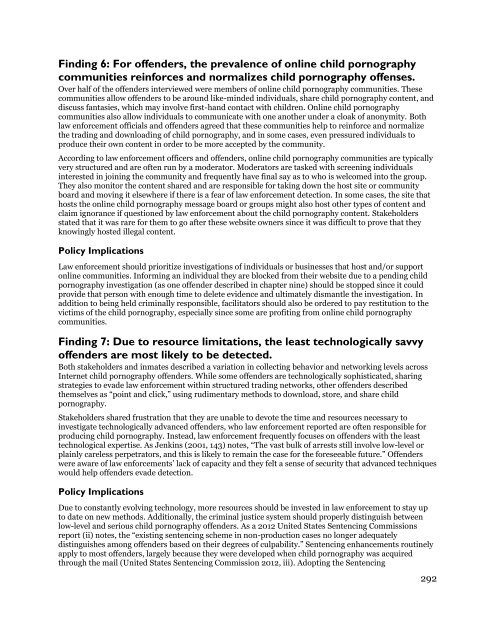413047-Underground-Commercial-Sex-Economy
413047-Underground-Commercial-Sex-Economy
413047-Underground-Commercial-Sex-Economy
Create successful ePaper yourself
Turn your PDF publications into a flip-book with our unique Google optimized e-Paper software.
Finding 6: For offenders, the prevalence of online child pornography<br />
communities reinforces and normalizes child pornography offenses.<br />
Over half of the offenders interviewed were members of online child pornography communities. These<br />
communities allow offenders to be around like-minded individuals, share child pornography content, and<br />
discuss fantasies, which may involve first-hand contact with children. Online child pornography<br />
communities also allow individuals to communicate with one another under a cloak of anonymity. Both<br />
law enforcement officials and offenders agreed that these communities help to reinforce and normalize<br />
the trading and downloading of child pornography, and in some cases, even pressured individuals to<br />
produce their own content in order to be more accepted by the community.<br />
According to law enforcement officers and offenders, online child pornography communities are typically<br />
very structured and are often run by a moderator. Moderators are tasked with screening individuals<br />
interested in joining the community and frequently have final say as to who is welcomed into the group.<br />
They also monitor the content shared and are responsible for taking down the host site or community<br />
board and moving it elsewhere if there is a fear of law enforcement detection. In some cases, the site that<br />
hosts the online child pornography message board or groups might also host other types of content and<br />
claim ignorance if questioned by law enforcement about the child pornography content. Stakeholders<br />
stated that it was rare for them to go after these website owners since it was difficult to prove that they<br />
knowingly hosted illegal content.<br />
Policy Implications<br />
Law enforcement should prioritize investigations of individuals or businesses that host and/or support<br />
online communities. Informing an individual they are blocked from their website due to a pending child<br />
pornography investigation (as one offender described in chapter nine) should be stopped since it could<br />
provide that person with enough time to delete evidence and ultimately dismantle the investigation. In<br />
addition to being held criminally responsible, facilitators should also be ordered to pay restitution to the<br />
victims of the child pornography, especially since some are profiting from online child pornography<br />
communities.<br />
Finding 7: Due to resource limitations, the least technologically savvy<br />
offenders are most likely to be detected.<br />
Both stakeholders and inmates described a variation in collecting behavior and networking levels across<br />
Internet child pornography offenders. While some offenders are technologically sophisticated, sharing<br />
strategies to evade law enforcement within structured trading networks, other offenders described<br />
themselves as “point and click,” using rudimentary methods to download, store, and share child<br />
pornography.<br />
Stakeholders shared frustration that they are unable to devote the time and resources necessary to<br />
investigate technologically advanced offenders, who law enforcement reported are often responsible for<br />
producing child pornography. Instead, law enforcement frequently focuses on offenders with the least<br />
technological expertise. As Jenkins (2001, 143) notes, “The vast bulk of arrests still involve low-level or<br />
plainly careless perpetrators, and this is likely to remain the case for the foreseeable future.” Offenders<br />
were aware of law enforcements’ lack of capacity and they felt a sense of security that advanced techniques<br />
would help offenders evade detection.<br />
Policy Implications<br />
Due to constantly evolving technology, more resources should be invested in law enforcement to stay up<br />
to date on new methods. Additionally, the criminal justice system should properly distinguish between<br />
low-level and serious child pornography offenders. As a 2012 United States Sentencing Commissions<br />
report (ii) notes, the “existing sentencing scheme in non-production cases no longer adequately<br />
distinguishes among offenders based on their degrees of culpability.” Sentencing enhancements routinely<br />
apply to most offenders, largely because they were developed when child pornography was acquired<br />
through the mail (United States Sentencing Commission 2012, iii). Adopting the Sentencing<br />
292


